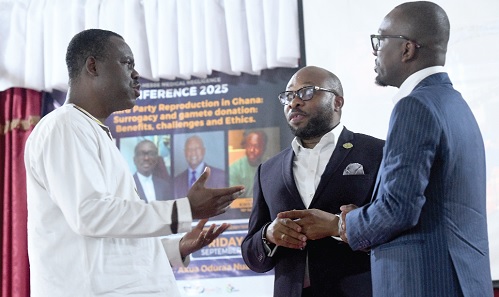
Framework for surrogate mothers, intended parents necessary — Fertility Society
The Fertility Society of Ghana has called for a regulatory framework for Assisted Reproductive Technology (ART) in the country.
It said such a framework and a national database would protect surrogate mothers, intended parents and unborn children.
The Vice-President of the society, Dr Promise Sefogah, said the country currently lacked a national registry to monitor fertility practices, making it difficult to track data such as the number of ART procedures, outcomes or potential abuse within the system.
He said although 19 fertility centres were recognised by the society, there was no oversight body mandating data submission, unlike systems in countries such as the US and the UK.
Dr Sefogah was speaking at the inaugural Malm-Hesse medical negligence conference in Accra.
The conference was on the theme: "Third party reproduction in Ghana: Surrogacy and Gamete Donation: Benefits, Challenges and Ethics."
It brought together health practitioners as well as nursing and midwifery students from selected schools.
Also present were Senior Associate from Ecam Law Consult and Convenor of the Conference, Christian L. Malm-Hesse; Head of Medical and Dental Unit, Ministry of Health, Dr Ernest Asiedu, and a Urologist and Commander of Surgeon at the 37 Military Hospital, Dr Paul Kudzo Yegbe.
Ethics
Dr Sefogah, an obstetrics gynaecology specialist, also expressed concerns over ethical breaches such as unregulated gamete donation, potential overuse by donors and medical risks like ovarian hyperstimulation syndrome, a condition arising from fertility treatments.
The specialist said although there existed international ethical guidelines, there was the need for the country to have specific regulations based on local realities to curb abuses, manage financial incentives for surrogates and ensure ethical and safe practices in third-party reproduction across the country.
Dr Sefogah also advocated a proper regulatory system to help address challenges in the sector such that once a woman became a surrogate she would not have to travel long distances or engage in high-risk activities.
System abuse
Mr Malm-Hesse also said that despite the growing use of ART and surrogacy by couples in the country, the lack of legal clarity and oversight had led to exploitation and commodification of surrogate mothers, as well as unethical practices by unlicenced or unregistered providers.
He also mentioned legal ambiguities, especially in areas like LGBT+ rights, access to surrogacy, limits on gamete donation to prevent consanguinity such as siblings unknowingly marrying, age and parental requirements for donors.
Mr Malm-Hesse also called for development of comprehensive laws on third-party reproduction, including clear sanctions for violations and ethical boundaries to avoid turning vulnerable women into commodities.
ARP Bill
The Head of Medical and Dental Unit, Ministry of Health, Dr Ernest Asiedu, said the country’s ARP policy, which was developed in collaboration with the Fertility Society of Ghana, was at an advanced stage and would be submitted to Parliament soon.
He said assisted reproductive procedures were emotionally and mentally significant, especially in a cultural context where having children was deeply valued.
